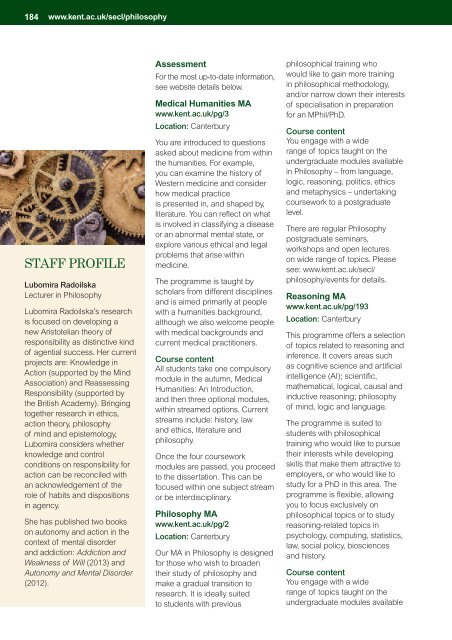prospectus
Create successful ePaper yourself
Turn your PDF publications into a flip-book with our unique Google optimized e-Paper software.
184<br />
www.kent.ac.uk/secl/philosophy<br />
STAFF PROFILE<br />
Lubomira Radoilska<br />
Lecturer in Philosophy<br />
Lubomira Radoilska’s research<br />
is focused on developing a<br />
new Aristotelian theory of<br />
responsibility as distinctive kind<br />
of agential success. Her current<br />
projects are: Knowledge in<br />
Action (supported by the Mind<br />
Association) and Reassessing<br />
Responsibility (supported by<br />
the British Academy). Bringing<br />
together research in ethics,<br />
action theory, philosophy<br />
of mind and epistemology,<br />
Lubomira considers whether<br />
knowledge and control<br />
conditions on responsibility for<br />
action can be reconciled with<br />
an acknowledgement of the<br />
role of habits and dispositions<br />
in agency.<br />
She has published two books<br />
on autonomy and action in the<br />
context of mental disorder<br />
and addiction: Addiction and<br />
Weakness of Will (2013) and<br />
Autonomy and Mental Disorder<br />
(2012).<br />
Assessment<br />
For the most up-to-date information,<br />
see website details below.<br />
Medical Humanities MA<br />
www.kent.ac.uk/pg/3<br />
Location: Canterbury<br />
You are introduced to questions<br />
asked about medicine from within<br />
the humanities. For example,<br />
you can examine the history of<br />
Western medicine and consider<br />
how medical practice<br />
is presented in, and shaped by,<br />
literature. You can reflect on what<br />
is involved in classifying a disease<br />
or an abnormal mental state, or<br />
explore various ethical and legal<br />
problems that arise within<br />
medicine.<br />
The programme is taught by<br />
scholars from different disciplines<br />
and is aimed primarily at people<br />
with a humanities background,<br />
although we also welcome people<br />
with medical backgrounds and<br />
current medical practitioners.<br />
Course content<br />
All students take one compulsory<br />
module in the autumn, Medical<br />
Humanities: An Introduction,<br />
and then three optional modules,<br />
within streamed options. Current<br />
streams include: history, law<br />
and ethics, literature and<br />
philosophy.<br />
Once the four coursework<br />
modules are passed, you proceed<br />
to the dissertation. This can be<br />
focused within one subject stream<br />
or be interdisciplinary.<br />
Philosophy MA<br />
www.kent.ac.uk/pg/2<br />
Location: Canterbury<br />
Our MA in Philosophy is designed<br />
for those who wish to broaden<br />
their study of philosophy and<br />
make a gradual transition to<br />
research. It is ideally suited<br />
to students with previous<br />
philosophical training who<br />
would like to gain more training<br />
in philosophical methodology,<br />
and/or narrow down their interests<br />
of specialisation in preparation<br />
for an MPhil/PhD.<br />
Course content<br />
You engage with a wide<br />
range of topics taught on the<br />
undergraduate modules available<br />
in Philosophy – from language,<br />
logic, reasoning, politics, ethics<br />
and metaphysics – undertaking<br />
coursework to a postgraduate<br />
level.<br />
There are regular Philosophy<br />
postgraduate seminars,<br />
workshops and open lectures<br />
on wide range of topics. Please<br />
see: www.kent.ac.uk/secl/<br />
philosophy/events for details.<br />
Reasoning MA<br />
www.kent.ac.uk/pg/193<br />
Location: Canterbury<br />
This programme offers a selection<br />
of topics related to reasoning and<br />
inference. It covers areas such<br />
as cognitive science and artificial<br />
intelligence (AI); scientific,<br />
mathematical, logical, causal and<br />
inductive reasoning; philosophy<br />
of mind, logic and language.<br />
The programme is suited to<br />
students with philosophical<br />
training who would like to pursue<br />
their interests while developing<br />
skills that make them attractive to<br />
employers, or who would like to<br />
study for a PhD in this area. The<br />
programme is flexible, allowing<br />
you to focus exclusively on<br />
philosophical topics or to study<br />
reasoning-related topics in<br />
psychology, computing, statistics,<br />
law, social policy, biosciences<br />
and history.<br />
Course content<br />
You engage with a wide<br />
range of topics taught on the<br />
undergraduate modules available



